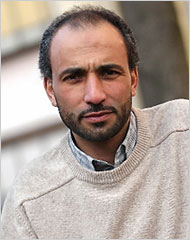 Last Thursday, Tariq Ramadan addressed his first American audience in over five years. Before a crowd that filled the historic Great Hall at Cooper Union, Ramadan, alongside panelists Dalia Mogahed, George Packer, Joan Wallach Scott, and moderator Jacob Weisberg, discussed his understanding of the unique position of the Western Muslim, stressing his view of the compatibility of that which is “Western” and that which is “Islamic,” and emphasizing his faith in the creative potential of Western Muslims to elaborate and inhabit a distinctly Western Islamic tradition. At once a celebration of intellectual freedom and a small victory over ideological exclusion, the event afforded Ramadan the opportunity to present in person his sometimes controversial stances and to respond to questions he has frequently been asked concerning his family background and his personal views on issues associated with gay and women’s rights.
Last Thursday, Tariq Ramadan addressed his first American audience in over five years. Before a crowd that filled the historic Great Hall at Cooper Union, Ramadan, alongside panelists Dalia Mogahed, George Packer, Joan Wallach Scott, and moderator Jacob Weisberg, discussed his understanding of the unique position of the Western Muslim, stressing his view of the compatibility of that which is “Western” and that which is “Islamic,” and emphasizing his faith in the creative potential of Western Muslims to elaborate and inhabit a distinctly Western Islamic tradition. At once a celebration of intellectual freedom and a small victory over ideological exclusion, the event afforded Ramadan the opportunity to present in person his sometimes controversial stances and to respond to questions he has frequently been asked concerning his family background and his personal views on issues associated with gay and women’s rights.
Ramadan’s diverse audience included both detractors and supporters: Waiting on line to pass through the metal detectors that blocked the entrance to the Great Hall, a crowd of well-heeled middle-aged women passed out homemade pamphlets entitled “The Islamic Repression of Free Speech: An Abridged History,” while groups of young, veiled women chatted excitedly nearby. When George Packer addressed Professor Ramadan, the divisions in the audience became palpable. Upon welcoming Ramadan back to America, he elicited a fervent round of applause from one segment of the auditorium, and when questioning him pointedly on his stance regarding his grandfather Hassan al-Banna’s (d. 1949) relationship with the Grand Mufti Mohammad Amin al-Husayni (d. 1974), an infamous anti-Zionist Nazi collaborator, he received a similarly enthusiastic response from a noticeably different section of the crowd.
A prolific writer, university professor, and perhaps one of the most visible public intellectuals of his kind, Ramadan occupies a distinctive role among Muslim leaders. He is a scholar of Islam, but not an Islamic scholar in the traditional sense: He has studied at Al-Azhar, but his background—and current position—is in the Western academy. His controversial family history tends to invite an easy sensationalism, and in a sense he is the heir to his grandfather’s legacy. The content of their thought is not the same, but their positions in the ummah, as laymen who reside outside of the traditional juristic bounds of Islamic authority yet are capable of inspiring and leading Muslims, represent the same trend.
One of the fundamental assumptions around which Ramadan constructs his thought is that Muslim and Western principles are compatible: Muslims can be Western; indeed, many Muslims are Western. Thus, Ramadan’s discourse does not revolve around “Muslims in the West” or the problems posed by “the Muslim presence in the West,” but rather around the identity and status of Western Muslims and how they can be active and engaged participants in European and North American public life. Rather than resigning themselves to a minority mentality, Ramadan urges Muslims to internalize this sense of belonging as they, through a contemplative and inward-looking process of reinterpretation and reform, utilize the tools of their own tradition to mold a distinctly Western Islam.
The question and answer portion of the evening was dominated by the sort of polemically intonated questions that Ramadan often confronts, concerning, for example, his call for a moratorium (and not a ban) on the stoning of adulterous women in the Islamic world—which he justifies with the explanation that Muslim jurists must have time to discuss the issue and ban it on their own terms in order to prevent such a reform from being perceived as a Western imposition or import—or past statements he has made on homosexuality. While it may be useful to know where Professor Ramadan stands on such issues, a focus on these inquiries, to which he has already often responded in other forums, inhibits further dialogue with this creative thinker. Now that Ramadan is allowed back on American soil, and as other scholars who have been excluded from the United States on ideological grounds begin to travel here, we may seek to move beyond polemic as we engage in cross-cultural discussion on sensitive but essential issues.












